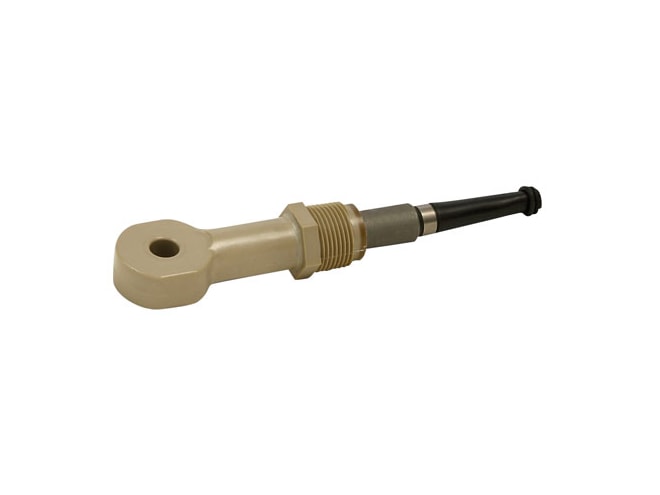
Rosemount Analytical Model 228 Conductivity Sensor
Submersion/Insertion toroidal (non-contacting) sensor for use in dirty, corrosive, or high conductivity liquids.

Overview
Features
- Rugged construction
- Max Temp;
- PEEK: 120°C (248°F)
- PEEK: 200°C (392°F)
- Tefzel: 120°C (248°F)
- Max Pressure;
- PEEK: 295 psig
- Tefzel: 200 psig
- Tolerates high vibration
- Max cable length: 200ft
- Integral RTD
Description
The Model 228 is a submersion-insertion type toroidal sensor. Because it measures conductivity by inducing a current, the toroids do not need to touch the sample, but can be encased in plastic. Thus, unlike metal electrode sensors, the Model 228 sensor can be used in corrosive and dirty samples. It is also ideal for measuring high conductivity liquids.
The sensor is available in glass-filled PEEK and in filled and unfilled Tefzel®. The temperature limit is 248ºF (120ºC); although a high temperature (392ºF (200ºC)) PEEK version is available. The pressure limit for PEEK body sensors is 295 psig (2135 kPa abs) and for Tefzel body sensors is 200 psig (1480 kPa abs).
Mechanical and manual retraction assemblies that allows the sensor to be removed from the process piping without shutting down the process and draining the line is also available.
Documents
Accessories
Cables
Mounting Bracket
Accessories
Please consider these optional accessories.
Applications
This product can be used in the following applications:
Here's how some of our customers use this product...
Measuring Acid Concentration Via Conductivity
The Background: A manufacturing company uses a very strong acid as part of its manufacturing process and needs to monitor the strength of the acid
The Problem: Typical pH probes are generally designed for measuring between 2 and 12 pH. Outside of that range, accuracy is greatly diminished. To account for this, it is common to measure the concentration of the acid or base with a conductivity meter rather than measuring the pH level. One problem with this is that standard contacting conductivity probes are likely unable to handle the corrosive nature of strong acid and bases.
The Solution: The Rosemount 228 is a toroidal conductivity sensor that measures conductivity by inducing a current, a technology that does not require contact with the sample making it ideal for highly corrosive environments. The 228 will provide accurate conductivity readings as a way to determine the concentration of an acid or base.
Need Help? Call a Flow engineer at 1-800-884-4967
We're open Mo-Th 8am to 5:30pm. Fr 8am to 5pm ET









